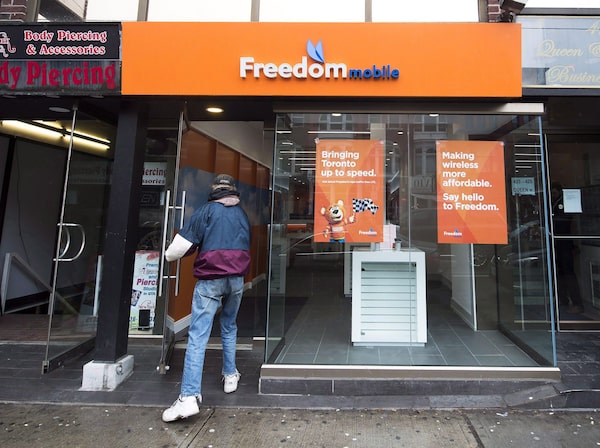
A man enters a Freedom Mobile store in Toronto on Nov. 24, 2016.Nathan Denette/The Canadian Press
Videotron Ltd.’s Freedom Mobile has launched a new $50 wireless plan that allows customers to use their mobile data outside of Freedom’s network, its opening shot in a renewed battle between Canada’s telecoms to capture more mobile phone customers.
The plan comes with unlimited talking and texting, as well as 40 gigabytes of data, and can be used anywhere in Canada and the United States at no additional charge. Previously, Freedom’s customers would have their data throttled when they were outside of Freedom’s network in Ontario, Alberta and British Columbia.
The announcement accords with promises Videotron made to the federal government as a condition of acquiring Freedom. The $2.85-billion takeover closed less than two months ago.
Freedom’s previous owner, Shaw Communications Inc., divested the carrier in order to address regulators’ concerns that Rogers Communications Inc.’s RCI-B-T $20-billion takeover of Shaw would reduce competition by eliminating Canada’s fourth-largest wireless carrier.
During a month-long hearing in front of the Competition Tribunal in late 2022, Rogers, Shaw and Quebecor Inc., QBR-B-T Videotron’s parent company, had argued that allowing Videotron to acquire Freedom would increase competition in the wireless sector. The Competition Bureau, which opposed the transaction, argued that Freedom would be a weakened competitor in Videotron’s hands. The tribunal ultimately permitted the takeover to go ahead, as did federal Industry Minister François-Philippe Champagne, who approved the transfer of Shaw’s wireless licenses to Videotron earlier this year.
Opinion: If Rogers-Shaw deal is good for competition, how is it good for Rogers-Shaw?
The promises Videotron made to the federal government as part of the three-way deal are contained in written undertakings that include penalties for the Montreal-based telecom if it fails to meet its commitments.
Videotron has pledged that, over a period of 10 years, it will offer wireless plans that cost 20 per cent less than those offered by the major wireless carriers on a specific benchmark date: Feb. 10, 2023. The telecom has agreed to pay the government $25-million for each year where it does not meet that promise, starting in the third year, up to a maximum of $200-million.
Rogers was advertising 40-gigabyte plans in Ontario, Alberta and B.C. for $95 a month on the benchmark date, while BCE Inc.’s BCE-T Bell Canada was offering 45 gigabytes of data for $95 and Telus Corp. was offering 50 gigs for that price, according to benchmark prices posted online by Innovation, Science and Economic Development Canada.
Prices from the large carriers have come down since then. Rogers has recently introduced a 50-gigabyte plan for $85 and a 25-gigabyte plan for $60. Bell and Telus are both currently advertising $65 plans offering 50 gigabytes of data.
Videotron has also promised to spend more than $150-million upgrading Freedom Mobile’s network. And it has pledged to offer fifth-generation wireless services to 90 per cent of its customers within two years, among other commitments.
“Quebecor has moved quickly to walk the talk since acquiring Freedom on April 3,” the company said in a news release announcing the new $50 wireless plan.
“Freedom’s teams are now working on upgrading the wireless network to support the upcoming implementation of 5G technology and seamless roaming, two key enhancements that will further improve the Freedom customer experience and stimulate competition for the benefit of Canadians,” the company added.
Shaw acquired Freedom, which was then called Wind Mobile, in 2016. Even though Shaw invested billions in the carrier, Freedom’s network has continued to lag the major carriers, who have all launched 5G services.
Quebecor and Rogers head to arbitration with CRTC over MVNO terms
Ben Klass, a telecom researcher and PhD candidate at Carleton University, called Thursday’s announcement a “welcome sign” that Videotron has begun making incremental improvements since taking over Freedom.
“I think the most notable aspect of this announcement is the elimination of geographic boundaries limiting data usage – no more confusing distinction between ‘Freedom network/nationwide network’ dictating where customers can or cannot use their data plan,” Mr. Klass said in an e-mail.
“This change brings Freedom’s offer closer in line with those of the national carriers and therefore should put some pressure on Bell, Telus and Rogers to respond.”
Mr. Klass said he’s hopeful that Freedom will also remove the “unnecessary and punitive” geographic limits from its less expensive plans, as well.
“It would be unfortunate if adequate coverage became a luxury item or an [upselling] opportunity for the industry; I think people expect and deserve to be able to use their devices wherever they are without having to worry about getting cut off or incurring unexpected penalties,” he added.